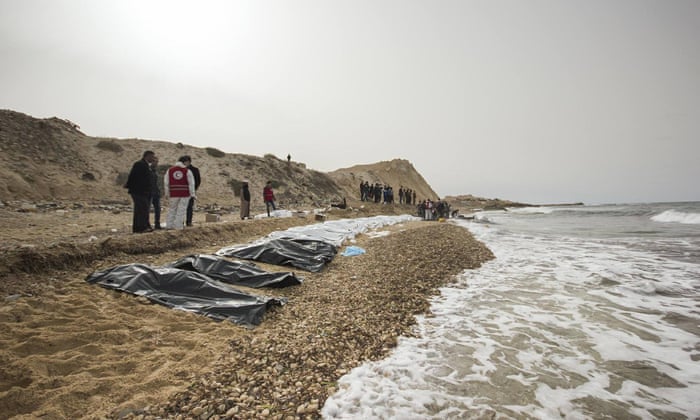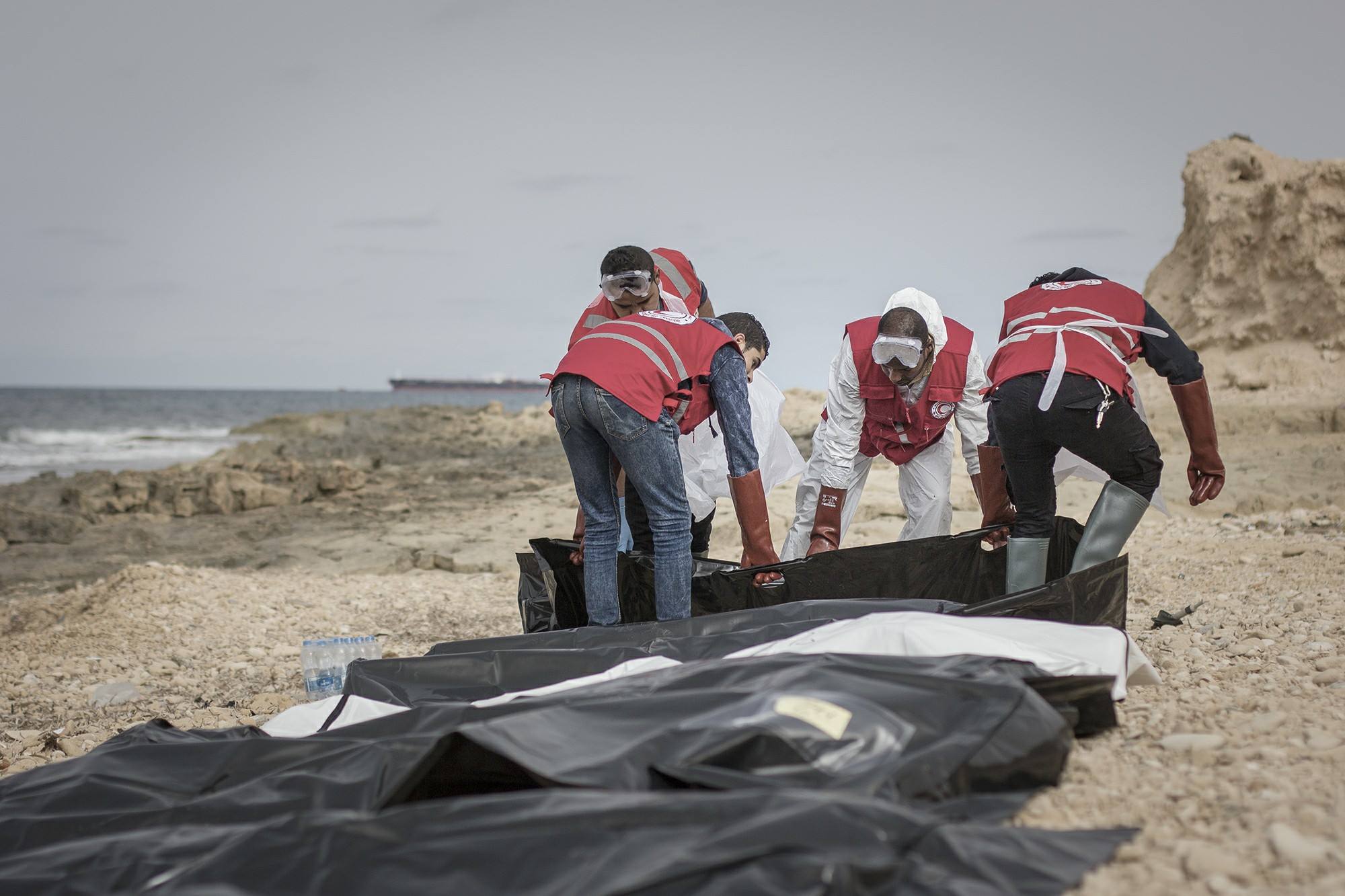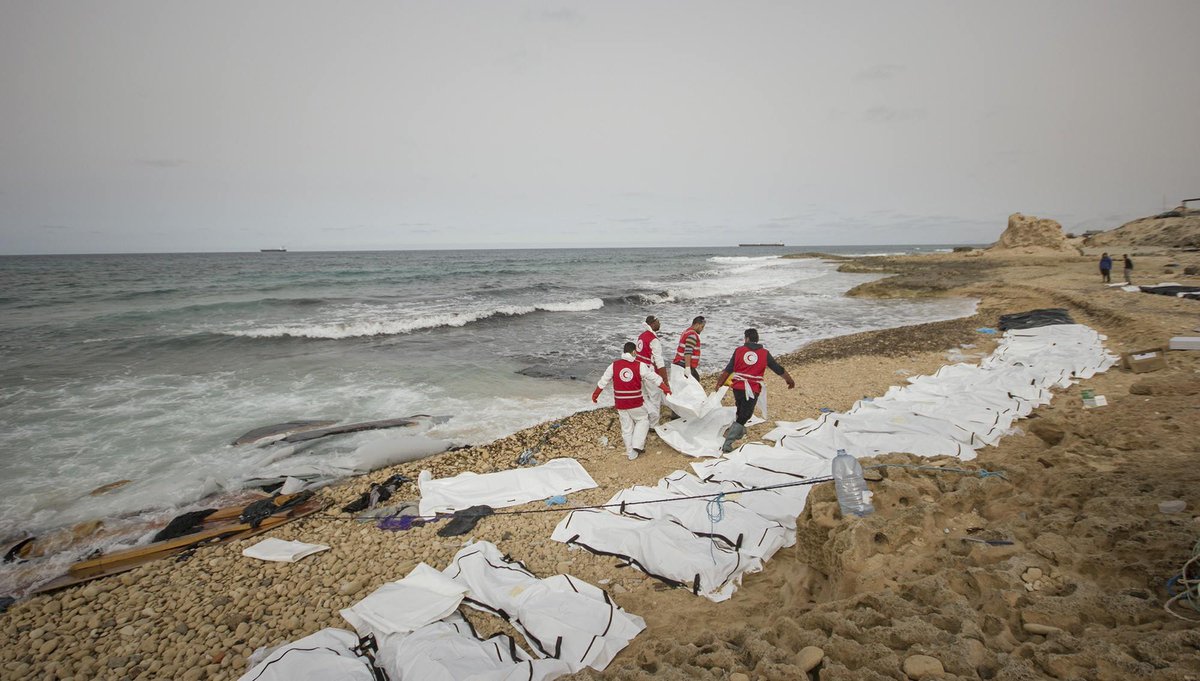The Holy Grail of Haven
"We are seeing the new boats, which are not equipped with anything, but they carry more people."
"This is going to be even more disastrous for the migrants."
Ayoub Gassim, Libyan coast guard spokesman
"It's really strange that smugglers would take off the engine [removing from the large inflatable rubber flotation devices the only method by which they can be moved in the choppy waters of the Mediterranean, before abandoning those packed into the rubber watercraft to their fate]."
Flavio Di Giacomo, spokesman, International Organization for Migration, Rome
"Traffickers came and removed the engine from the boat and left the craft adrift."
"This is not a only horrible number of deaths in one incident but it strikes us as something that we haven’t really seen much of, which is either deliberate punishment or murder of migrants."
Joel Millman, spokesman, International Organization for Migration (IOM)
 |
| The bodies were found on the beach on Monday morning. Photograph: Libyan Red Crescent |
Not so strange, actually. The human smugglers don't concern themselves overly with the conditions they deliberately place vulnerable men, women and children in. Uppermost in their minds is the profit they will gain through their enterprise. And keeping their own costs to a minimum is key to exactly how much profit will fall to them. The rubber craft are expendable, the engines that drive them to their purported destination of freedom can be re-used, why waste them?
There is a world-wide pandemic that the World Health Organization has not yet addressed itself to. The propensity of people to risk their lives in a venture that clear thinking would identify as inimical to survival. Biologists were always baffled at the natural phenomenon of lemmings flooding a landscape in a mass move to commit themselves to a fated destiny, by throwing themselves over cliffs. Until they decided that wasn't what happened at all.
"An army of lemmings advanced with extraordinary purpose, 'never suffering itself to be diverted from its course by any opposing obstacles', not even when confronted by rivers, or even the branches of narrow fjords. 'They are good at swimming'," explained Nils Christian Stenseth of the University of Olso in Norway. 'They can easily go across small bodies of water, across small lakes'." It is predators like stoats that biologists now attribute their massive die-offs to.
In the world of humankind, the stoats are the corrupt governments that dispossess their citizens of their basic human rights, causing poverty and hopelessness, tribal repression and ethnic cleansing, amid sectarian-motivated conflicts. The governments that take for themselves the riches that natural resources gain, meant for the improvement of the country, while repressing and constricting opportunities for the masses.
 |
| IFRC MENA ✔ @IFRC_MENA |
And who, despite all the dangerous obstacles they most surely are aware of that they will encounter in the vast distances they must cover to reach a place of haven, embark on such journeys, risking those very real, and impending dangers. All the more so when it has become common knowledge that thousands of migrants and would-be refugee and asylum seekers have died attempting to cross from North Africa and the Middle East toward the shores of Europe.
The mass psychosis once attributed to lemmings now appears to have infected people desperate to escape their fate of limited life experiences, poor health outcomes, starvation, government instituted massacres and the stasis of mental and physical impoverishment. And so, for them there is no such thing as 'better judgement'. They compartmentalize the shocking news of thousands drowning when unstable watercraft disintegrate leaving their passengers to a watery fate. It happens, it will happen.
Their luck would prevail. They harbour such desolate thoughts of their circumstances that they feel, alternately, that taking the gamble is their only choice. That should they lose, all they will give away is a life not worth living. The temptation to reach a harbour where they will be accepted, however reluctantly, because there are sympathetic responses to their plight, and they will, given time, prosper there and obtain a life hitherto denied them, is the motivating factor.
There may be people indigenous to the country they are entering 'illegally' whose status is as compromised by poverty and lack of opportunity equal to their own, but they would not believe that to be so, in any event. They risk everything, and yet nothing. The popular sea traffic route to Europe gave up 74 dead bodies this past week, and winter is not yet over, leading those on the receiving end of the endless stream of migrants and death, to speculate on what spring will bring.
 |
| IFRC MENA ✔ @IFRC_MENA |
The smuggling season reaching from Libya to Europe on a wintry sea route has begun with a vengeance; what is yet to come is horrendous in its outcome. Close to the bodies of the dead African migrants, more bodies were noted floating out further at sea, along with a torn rubber boat. The smugglers, noted Mr. Gassim, left Libya for Italy on Saturday and were left to drift for several days. The rubber boat was packed with up to 180 people; a number more likely to capsize such a fragile vessel.
But this obvious observation appears not to have deterred those who boarded from doing so.
A week ago Friday and Saturday over 500 other migrants were rescued while at sea. In January alone 228 deaths at sea were recorded. The total for 2016 was over 4,500 drowning deaths, migrants on smuggling routes from Libya to Italy, according to a European Border and Coast Guard Agency report. With the acknowledgement that the figure given represents a low estimate since so many deaths are unrecorded. With each year that passes the death toll increases over that of the year before.
The boats are poorly built, they are smaller than in previous years, yet they are packed tight with migrants, shipped in greater numbers than previously, to maximize profit. This year the average boat carries 150 each vessel, whereas in years previously the average per vessel had been roughly 100 migrants. Sub-Saharan Africa as well as the Middle East are the sources for most of the migrants, convinced a better life awaits them in Europe.
And Europe shudders.
Labels: Disaster, Europe, Haven, Middle East, Migrants, North Africa, Refugees

<< Home